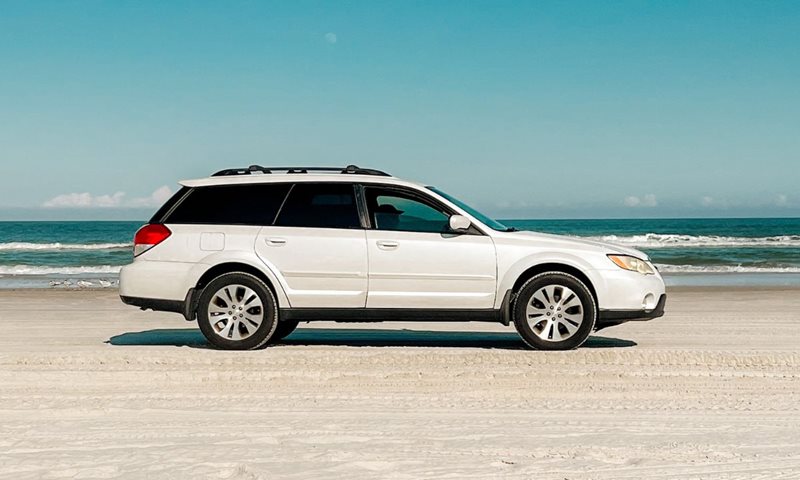Sadly, there’s no easy, one-size-fits-all answer to this question. Depending on the situation, one might be better than another.
The key is to know your options and how to evaluate your personal circumstances to make the best choices for your needs.
With this post, we hope to help you understand the:
- Basics of auto loans
- Differences between financing a used car versus a new car
- Upsides and downsides of loans for new and pre-owned vehicles
- Considerations for selecting the right car and loan for yourself

How Car Loans Work
Before taking the plunge and signing on that enticing dotted line, you should know full well how car loans work. It’s important to understand what you’re getting and at what cost. And, you’ll be better able to enjoy your new vehicle if you are crystal clear on your obligations with the loan.
Buying a Car 101
Before getting into loan anatomy, let’s cover some basic money matters related to buying a car.
- Sticker price. Often shown as the MSRP (manufacturer’s suggested retail price), this is the cost of the car with the features it includes (e.g., any options or upgrade bundles).
- Upsells and add-on costs. These are things like pre-paid service and maintenance packages and anti-stain fabric treatments, which are sometimes offered when doing the paperwork to buy a [usually new] car.
- Down payment. This is the chunk of money you have on hand at the time of purchasing your car.
You can try to haggle on the finer points of each one of these things to get the most value for your car-buying dollars.
Components of an Auto Loan
The main parts of a loan — for a new or used vehicle — include:
- The principal. This is the amount you’re borrowing. It’s usually equal to the price of the car minus your down payment.
- The interest. This is the cost you’re incurring for borrowing the principal.
- The interest rate. This is the percentage used to calculate the interest amount.
- The terms and conditions. These are the details that stipulate the rights and obligations of the lender and borrower — like the duration of the loan, frequency and amount of repayment installments, etc.
All of these items are negotiable. And it’s in your best interest to do some research before sitting down with a lender to hammer out the details. It’s your best shot at getting the best deal possible!
How To Finance a New or Used Car
There are a few ways to finance a car. Assuming you’re not cashing in at the “Family Bank,” you’ll likely have the options of direct lending or dealer financing. Direct lending is when you get a car loan from a financial institution like a credit union (VCU!). With dealer financing, the auto seller is essentially fronting the money for you to buy the car.
Generally speaking, direct loans will be the less expensive road to take. And, fortunately too, the loan process is simple:
- You submit an application form with supporting documentation (like proof of income).
- Someone at the financial institution reviews your paperwork and determines whether or not to lend you the money.
- You get the decision.
If you’re approved, the lender will issue you a check (made out to the car seller) for the amount of the loan. You present this check to the auto retailer as payment on the vehicle. Then adjust those mirrors, toot your horn, and drive off that lot as the proud owner of a new car!
You can make the process even faster and easier if you get pre-approved for a car loan. When you’re pre-approved, you’ll know how much you can spend before you go car shopping.
.jpg?width=800&height=480)
Pros & Cons of Financing a Used Car
There are a lot of good things about getting a used vehicle! Used cars typically have a smaller price tag and depreciate (lose value over time) more slowly. Many dealers offer certified pre-owned cars, which means you can have confidence that you’re not getting a four-wheeled lemon.
The Good
Financing your “new” used vehicle may be of great benefit to you.
- You won’t have to pay the whole cost of the car at once and up front.
- You’ll be able to use the loan to help build your credit.
- Compared to financing a new car, you’ll have a smaller loan that you’ll be able to pay off sooner.
The Bad
However, there may be some drawbacks to financing a used car.
- Used car loans tend to have higher interest rates.
- You might not get to take advantage of special offers that often come with new cars (like 0% intro rate or extra discounts).
- Your car may depreciate to less than the amount of your loan balance.
- You’ll still have another bill to pay each month.

Advantages & Disadvantages of a New Auto Loan
Being the first ever owner of a sparkling new car certainly has its appeal! But is it worth it?
New cars come in at a more substantial price point than their used counterparts. The trade off is getting the latest vehicle model with all the fancy features and intangible trappings (e.g., reliability, warranty, new car smell). Also, you may have more automobiles and customizations to choose from so you can get the ride you really desire.
The Pretty
Financing a new car has its perks, too.
- It eases the burden of having to pay for your vehicle in one lump sum before you get the keys for keeps.
- Having the loan can help establish your credit record.
- It’s frequently easier to get a loan for a new car than a used one — you’ll probably have more options and find better rates.
The Ugly
There may be some catches to financing a new car, though.
- You’ll likely have to take out a larger loan than for a used vehicle.
- Your down payment will probably be heftier.
- You may be required to carry more auto insurance.
- The risk of default could be greater.
- New cars depreciate at turbo speed so you could end up being underwater on your loan (owing more than the car’s value).
- It’s still a monthly payment to account for.

Picking the Right Car + Loan Combo
So, which car should you get — new or used? So much to consider, and so many important decisions to make!
Don’t let this overwhelm you. If you take it one piece at a time and thoughtfully (and honestly) evaluate your lifestyle and financial picture — the solution might just reveal itself.
And, remember, there’s no single ideal loan or car type for everybody. We all have unique requirements and constraints. Plus, these are apt to change with different life stages.
Things to Consider
We’ll assume that you’re definitely going to replace your current vehicle and finance the purchase of your next car — that’s a foregone conclusion. With that big decision out of the way, before you go hunting for your next car, you need to think about the following:
- Do you need a brand new car or will a used car suffice? Why?
- What’s your monthly budget for a car payment?
- How much money do you have for a trade-in?
- What’s your credit history like? Do you have a credit score that will allow you to get a car loan, and at what rate?
- What’s your long-term plan for the car? Do you plan to own it long-term or just for a few years?
- If you’re a first-time car buyer, will you need a cosigner?
You can game out the numbers with a loan calculator. The rest of the questions are a matter of personal reflection and preference. This exercise will help you determine what kind of car and financing will work for you now and going forward.
But, you don’t need to stress over this alone! Valley Credit Union’s loan officers are available to counsel and assist members.

More Car Buying & Financing FAQs
Can You Refinance a Car Loan?
Yes! Refinancing basically means you’re trading an old auto loan in for a new one. With a new loan, you have the opportunity to shop around and kick the tires (so to speak) of different loan options.
Should You Trade in Your Old Car?
This depends on your situation. If you still owe money on the vehicle, it might not be wise to use it as a trade-in. If you need an additional car for your family, you may want to keep your old car. On the other hand, trading in a car you no longer want or need is a great way to offset some of the cost of a new-to-you vehicle or could be a way to reduce the needed down payment.
What about Buying or Leasing a Car?
These are viable and attractive options for many people. If you have the funds available to buy a car outright — it could make sound financial sense to do so. Leasing could be a good choice for many reasons — size of monthly payments, less hassle with maintenance, etc. — buy, in the end, you won’t own the car after making all those payments. With buying or leasing, you’ll have to run the numbers to see if it’s the best use of your money, helps achieve any credit-building goals you may have, and has the end result you want.
.jpg?width=800&height=480)
Let Valley Credit Union Help You with Your Next Auto Loan!
At VCU, we’ve been serving members with their loan needs for years. You’d only let a qualified mechanic work on your shiny new car. Similarly, you should come to us if you want expert loan advice and the best results.
Simply contact us today and we’ll see how we can get you behind the wheel of your next car.
About the Author

 Justin Roberts, Vice President of Lending
Justin Roberts, Vice President of Lending
Justin Roberts is our Vice President of Lending and has been in the financial industry for over 18 years. He is an Oregon State University Graduate and has just completed Western CUNA Management School. When he is not focused on helping the members at Valley, you will find him coaching his two sons and volunteering his time to help develop the youth in our communities through sports.